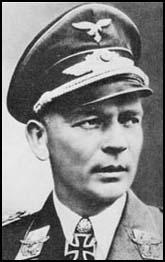Wolfram Richthofen

Wolfram Richthofen was born in Gut Barzdorf, Germany in 1895. He joined the German Army in 1913 and served throughout the First World War and saw action on the Western Front and the Eastern Front. In March 1918, Richthofen, the cousin of Manfred von Richthofen, Germany's leading flying ace, qualified as a pilot with German Army Air Service.
After the war Richthofen studied engineering (1919-22) before rejoining the German Army. When Hermann Goering announced the formation of the Luftwaffe in 1933, Richthofen immediately joined and become one of the organizations chief technical assistants.
In 1936 Richthofen went to Spain with the Condor Legion. During the Spanish Civil War he was leader of combat formations and was appointed as chief of staff to Hugo Sperrle. In September 1938 he was promoted to major general and remained to support General Francisco Franco until returning to Nazi Germany in May 1939 when he became commander of the legion.
After the outbreak of the Second World War Richthofen led the 8th Air Corps and in Poland directed the attempt to destroy Warsaw. He also played an important role in the blitzkrieg tactics used during the Western Offensive. This included the use of Junkers Stuka dive bombers to give air support to Walther von Reichenau and his 6th Army in Belgium and General Paul von Kleist and his forces in France.
In the Battle of Britain his 8th Air Corps had the mission of winning air superiority over the Royal Air Force. Like other leaders of the Luftwaffe, Richthofen was shocked to discover that the Supermarine Spitfire and Hawker Hurricane were able to out-perform German aircraft during the battle.
In April 1941, Richthofen provided air support for the German invasion of Greece. After the battle for Crete he was awarded the Oakleaves (17th July 1941). He then commanded the 2nd Air Force in Italy before being sent to support Field Marshal Erich von Manstein and the Army Group South during the invasion of the Soviet Union.
Richthofen then had the task of supplying General Freidrich von Paulus and his 6th Army that was encircled in Stalingrad. Over a 72 day period the Luftwaffe delivered 8,350 tons of supplies. Casualties were high with 488 aircraft and over 1,000 crewmen lost.
On 17th February 1943, Adolf Hitler decided that Richthofen should become Germany's youngest field marshal. The following year Richthofen developed a brain tumor and in November 1944 retired from active duty. Wolfram Richthofen died on 12th July 1945.
